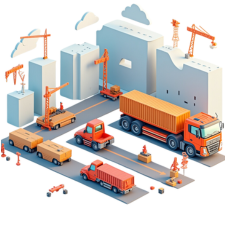Scope of Managed Supply Chain Solutions
At Zeometrix, our managed supply chain solutions encompass a wide range of services, including:.
- Inventory Management: We optimize inventory levels to minimize holding costs while ensuring the availability of critical components and products.
- Logistics and Distribution: Our robust logistics network enables efficient transportation, warehousing, and last-mile delivery to meet customer demands effectively.
- Supplier Relationship Management: We collaborate with suppliers to establish strategic partnerships and ensure a stable and reliable supply base.
- Demand Forecasting: Our data-driven approach to demand forecasting helps businesses anticipate market trends and align their supply chain accordingly.
- Continuous Improvement Initiatives: We foster a culture of continuous improvement, identifying opportunities to enhance supply chain efficiency and responsiveness continually.
Everything Your Company Needs to Grow

Manufacturing
From raw material procurement to finished product distribution, we optimize the manufacturing supply chain to enhance productivity and reduce lead times.

Automotive
We implement lean and efficient supply chain strategies to support the automotive industry's complex requirements for just-in-time delivery and high-quality components.

Electronics
We offer a diverse range of lighting products, including halogen connectors, reflectors, LED COB modules, ultraviolet LEDs, subminiature bulbs, SMD LEDs, laser diodes, neon lamps, and sodium lamps.
Stay Informed With the Zeometrix

Sustainability Strategies in Modern Supply Chains
By Orjo Bora
16-01-2025

Digital Transformation: The Future of Supply Chain Visibility
By Orjo Bora
16-01-2025

Supply Chain as a Service (SCaaS): Emerging Business Model
By Orjo Bora
16-01-2025







